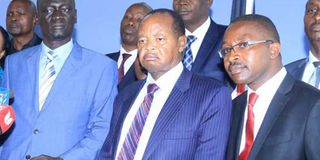Change of Constitution must strengthen devolution, not tinker with the Executive

A section of governors in this picture taken on November 8, 2017. PHOTO | JEFF ANGOTE | NATION MEDIA GROUP
What you need to know:
- Making the presidency ceremonial and PM head of government was dismissed as a daydream.
- Should one lose, one must fortify oneself against trauma at one’s cost.
Thinking Kenyans, principally clergy, cross-party moderates and opinion leaders, appear persuaded that the bitterness caused by the last presidential elections could have been ended or pacified sooner if there were more Executive jobs to go around.
They posit that Kenya’s winner-take-all elections spawn acutely competitive, resources-gobbling, life-and-death competitions.
These leave losers broke and broken and bitter with the entire process.
JUBILEE PARTY
There being top-tier jobs for only president, deputy president and 22 cabinet secretaries, it is argued, two communities disproportionately dominate government’s highest echelons.
Worse, Jubilee Party is accused of running a government that disburses state largesse to select regions.
Clergy, politicians and thought leaders are, therefore, recommending that the Constitution be amended to create the offices of prime minister and two deputy prime ministers to spread power and, therefore, diminish the bitterness in the land.
Last, it has emerged that some leaders are involved in behind-the-scenes canvasses for a switch to parliamentary democracy.
They appear convinced that this system has inbuilt safeguards against Kenya’s quinquennial polls-induced volatility. Several issues arise, chief among them instability in the Executive.
The main reason the so-called Mt Kenya mafia of President Mwai Kibaki’s time, rejected Prof Yash Pal Ghai’s Constitution of Kenya Review Commission and forced its demise, was the unrest that would attend a PM’s office.
It was forcefully argued at Bomas that the friction the office would generate would be pervasive and cascading, thereby wreaking havoc in the Legislature, Judiciary, Public Service and, indeed, Kenya’s entire body politic.
DAYDREAM
Kenya, it was summed up powerfully by cabinet ministers Kiraitu Murungi and Amos Kimunya, among others, could ill afford two centres of power built around President and PM.
Making the presidency ceremonial and PM head of government was dismissed as a daydream.
Ministers held that in a parliamentary democracy the head of government, would be elected by MPs or be the leader of the majority party. Therefore Kenyans would lose the power to directly elect their chief executive who, in turn, would cease to be accountable to them.
That was in 2005. In 2008, as Kenyans fought over the result of the previous year’s presidential poll, they were handed Mr Raila Odinga as PM in a forced political marriage to prevent a full-scale civil war.
True, a cold war dogged President Kibaki’s second term.
Predictably, in 2010 MPs debating the draft constitution by the Committee of Experts settled for a presidential rather than parliamentary system.
Unpredictably, PM Odinga, ever a backer of parliamentary democracy, abruptly pivoted to the presidential column. He most likely changed sides because he was confident of succeeding President Kibaki.
TRAUMA
What has changed to make the PM’s office great now? Nothing. Second, as I say, polls are not called to unite people, but to cause them to choose between rival personalities and ideas.
Third, seekers of the presidency must be tough mentally and healthy. A presidential election is a zero-sum game; one wins everything or loses all. Should one lose, one must fortify oneself against trauma at one’s cost. Taxpayers should not pay people for not voting for them.
Fourth, expanding the national government is not inclusivity. Inclusivity is realised by policies that promote reduction of poverty, equality of opportunities, access to resources and basic services, jobs, and participation in decision-making. Now, this is what devolution was created to do.
Fifth, post-poll instability is not caused by scarcity of top-tier jobs or the trauma losers suffer. It is the way elections are run and nature of loss this brings about that trigger turbulent aftermath.
TALLYING
The cure is free, fair and credible polls. And, elections must mean the transparent process of registration, preparation, communication, voting, counting, tallying, transmission and declaration of results.
Listen to the Kofi Annan Foundation again: “Elections without integrity cannot provide winners with legitimacy, the losers with security and the public with confidence in their leaders and institutions…...
When political rivals and supporters don’t believe that the electoral process is free and fair, they seek less peaceful methods to change political direction and leadership.”
Failsafe elections will guarantee political certainty and, deepening devolution will realise inclusivity. Useful change of the Constitution must strengthen devolution, not tinker with the Executive.
Opanga is a commentator with a bias for politics [email protected]





